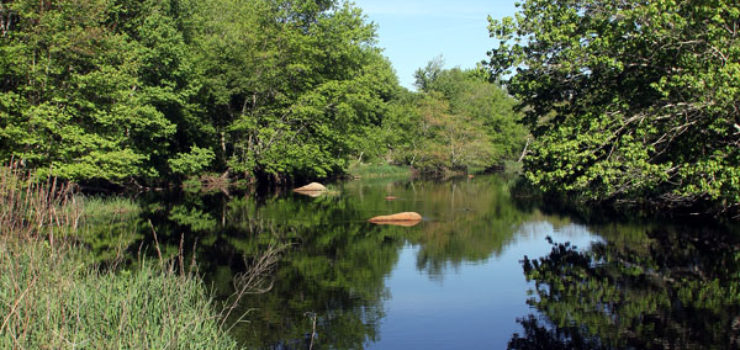RI Congressional Delegation Introduces Bill to Protect Wood-Pawcatuck Watershed
On October 2nd, on the 50th anniversary of the Wild and Scenic Rivers Act – created by Congress to preserve rivers with outstanding natural, cultural, and recreational values in a free-flowing condition for the enjoyment of present and future generations – U.S. Senators Jack Reed (D-RI) and Sheldon Whitehouse (D-RI) and U.S. Congressmen Jim Langevin (D-RI) and David Cicilline (D-RI) announced the introduction of the Wood-Pawcatuck Watershed Wild and Scenic River Act (S. 3533 and H.R. 6950).
A river’s classification as “wild” means there is little development in surrounding areas and “scenic” means it is still largely undeveloped, but accessible in places by roads.
Designating these segments of the 300-square mile Wood-Pawcatuck Watershed under the Wild and Scenic Rivers Act would open the door to additional federal preservation funding and support from the U.S. National Park Service. However, a Wild and Scenic designation would not give the federal government control of the property or prohibit future development.
The legislation will include parts of seven rivers: the Beaver, Chipuxet, Green Fall-Ashaway, Queen-Usquepaugh, Pawcatuck, Shunock and Wood rivers in Rhode Island and Connecticut under WSRA protections, further preserving Southern New England’s natural beauty.
The Rhode Island Congressional delegation was joined by their colleagues from Connecticut, including U.S. Senators Richard Blumenthal (D-CT) and Chris Murphy (D-CT) and Congressman Joe Courtney (D-CT) as cosponsors of the two respective bills.
Senator Reed and Congressman Langevin first introduced the Wood-Pawcatuck Watershed Protection Act in 2012 to initiate the study for inclusion of the rivers in the watershed as part of the National Wild Scenic River System and successfully had that bill included in the Fiscal Year 2014 National Defense Authorization Act (NDAA).
Last May, Reed, Whitehouse, Langevin, and Cicilline joined with the Wood-Pawcatuck Watershed Association and other local stakeholders to mark the completion of the Wood Pawcatuck Watershed Stewardship Plan to preserve the rivers. The plan was developed in consultation with town-appointed representatives from Charlestown, Exeter, Hopkinton, North Kingstown, Richmond, South Kingstown, Westerly and West Greenwich in Rhode Island and North Stonington, Sterling, Stonington, and Voluntown in Connecticut. The bi-state study committee also included partners from the Rhode Island Department of Environmental Management (RIDEM), the Connecticut Department of Energy and Environmental Protection (CT DEEP), the Wood Pawcatuck Watershed Association (WPWA), Save the Bay, The Nature Conservancy, and the Audubon Society of Rhode Island. Technical assistance for the study was provided by the National Park Service (NPS).
Thirty-six environmental organizations in Rhode Island and Connecticut have sent letters highlighting their support of the legislation. And all twelve towns in the watershed area have passed formal resolutions of support.
“Rhode Islanders love the outdoors. This effort is key to preserving the Wood-Pawcatuck watershed. Clean, healthy rivers are important to our environment and economy and we must take good care of them. I commend everyone who worked collaboratively to build community support and get us to this point. This bill would help ensure new sources of funding flow to Rhode Island for river restoration, environmental education, and other community-based conservation projects,” said Senator Jack Reed, a senior member of the Appropriations Subcommittee on the Interior & Environment, who noted that Rhode Island has received $176,000 in federal funds, as well as technical assistance from NPS to help with the study and to set up a stewardship council based on the Stewardship Plan.
“Anyone who has visited knows the Wood-Pawcatuck Watershed and its tributaries are special places,” said Senator Sheldon Whitehouse. “It is a unique ecosystem that supports important wildlife, and a wonderful place to enjoy the outdoors. That’s why I have joined my colleagues in the delegation to fight for this designation. It will help us unlock federal funds to preserve this vital watershed for generations to come.”
“Years of hard work and advocacy at the local and federal levels are paying off as we move another step closer to achieving a Wild and Scenic designation for the Wood-Pawcatuck watershed,” said Congressman Jim Langevin. “The pristine waterways that make up this watershed are core to the identities of several communities in Connecticut and Rhode Island. I am proud to keep pushing for these river systems to be recognized as Wild and Scenic to help preserve these important natural resources for future generations.”
“This bill would allow for the designation of segments of the Wood-Pawcatuck Watershed under the Wild and Scenic Rivers Act and would create the opportunity to bring back critical federal resources and funding to support important preservation in this area,” said Congressman David Cicilline. “We have so many natural resources that are enjoyed by Rhode Islanders and visitors each year. It is important that at the federal level we make resources available and work with local and state partners to protect our environment so that it can be enjoyed by all.”
“The introduction of this bill is the culmination of decades of work on the part of the Wood-Pawcatuck Watershed Association and our partners,” said Denise J. Poyer, Study Coordinator for the Wood-Pawcatuck Wild and Scenic Study Committee and project coordinator for the Wood-Pawcatuck Watershed Association. “Throughout the study we have received nothing but enthusiastic support from everyone who lives near, works with, or recreates on these beautiful rivers. Beyond the scientific reason for preserving the rivers, there is a distinct emotional reason – we all need these wild open spaces to renew and refresh our spirits.”
For more information about the study, visit: http://WPwildRivers.org
To date, over 200 rivers in 40 states across the country have been accepted into the National Wild Scenic River System, but so far none in Rhode Island have received the designation.
Now that the legislation has been introduced, it must be passed by both the U.S. Senate and the U.S. House of Representatives before it can be sent to President Trump to be signed into law.
Source for this story was a press release from Jim Langevin’s office. Photo of the Pawcatuck in Carolina by Cliff Vanover.
